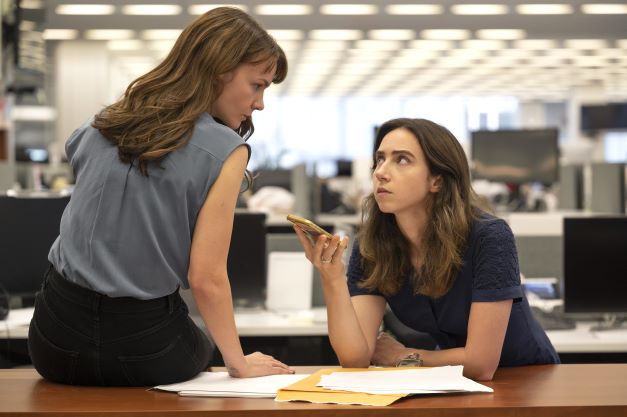![]() A movie was going to happen, sooner or later, about the investigation behind the 2016 New York Times article denouncing movie mogul Harvey Weinstein’s long history of sexual abuse and harassment against women. At the time, the former head of Miramax Films and founder of the Weinstein Company seemed secure in his position, assisted by a silent and complicit web that facilitated an environment where he faced no consequences and his victims felt pressured to stay silent. The exposé was fundamental to igniting the #MeToo movement and radically changing the conversations about power dynamics.
A movie was going to happen, sooner or later, about the investigation behind the 2016 New York Times article denouncing movie mogul Harvey Weinstein’s long history of sexual abuse and harassment against women. At the time, the former head of Miramax Films and founder of the Weinstein Company seemed secure in his position, assisted by a silent and complicit web that facilitated an environment where he faced no consequences and his victims felt pressured to stay silent. The exposé was fundamental to igniting the #MeToo movement and radically changing the conversations about power dynamics.
So now we finally have an indelible movie retracing the story that started it all, when two uncompromising journalists, Jodi Kantor (Zoe Kazan) and Megan Twohey (Carey Mulligan), accepted the delicate and formidable mission of asking the uncomfortable questions and finding those who had waited years for someone to listen to them and take action. As a fictional take on real-life events, She Said closes the circle for the women who stepped forward, went on the record, and became the providential authors of Weinstein’s fall.
Maybe there’s no better word to describe She Said than powerful, overused as it is. The briskly paced film, directed by Maria Schrader and written by Rebecca Lenkiewicz, portrays the meticulous investigation, fact by fact, as it follows the trail from many off-the-record confessions. In undertaking an archetypical tale of intrepid journalism, Schrader proves herself as an excellent disciple who knows the genre enough well to compile its “greatest hits” moments while keeping the material exciting and fresh.
Kazan and Mulligan are terrific as the new and equally charismatic versions of Dustin Hoffman and Robert Redford in this feminine (and feminist) answer to Alan J. Pakula’s All the President’s Men (1976). In a smart choice, the script looks into the personal lives of both women as wives and mothers, reconciling the challenging balance between domestic responsibilities and their careers. Meanwhile, Mulligan remains an incandescent presence on screen, providing fury and fire as she did in Promising Young Woman. The exceptional ensemble includes Patricia Clarkson, Margo Martindale, Angela Yeoh, Jennifer Ehle, and, above all, the crucial participation of Ashley Judd, one of Weinstein’s real-life victims, playing herself. The film may invite comparisons to Spotlight (2015), but Schrader’s has achieved something more dynamic and exciting in filmmaking terms (more akin to the work of Pakula or Sidney Lumet).
The subject is what matters most here, so the filmmakers don’t break new ground to distract from their focus. The German director manages to elevate a material by successfully transforming real life into a Hollywood film, while disclosing the beating heart of pain behind the film industry. The persuasive storytelling doesn’t shy away from advocacy, since abuse against women remains a prevailing subject, while it also works as a contemporary artifact. This is exemplified brilliantly by the introductory sequence, which takes place in 1992 on the film set of a period piece in the Irish countryside. There, a young female intern is welcomed into an alluring world. Then abruptly the film cuts to her running away barefoot and crying down a city street—a strong visual statement about the seductive spell of movie making, preceding the danger and horrors that may come with it. Unexpectedly, there are some moments of levity, like the running joke of Weinstein always asking if Gwyneth Paltrow has said something bad about him to the reporters. (We only hear his voice or see his back—actually, actor Mike Houston’s—on screen, a similar strategy used by the underseen and highly recommended The Assistant.)
Call it a hypocritical example of Hollywood atoning for its sins, if you want, but She Said is the most humane and best possible version of a story that was born to become a movie.







Leave A Comment